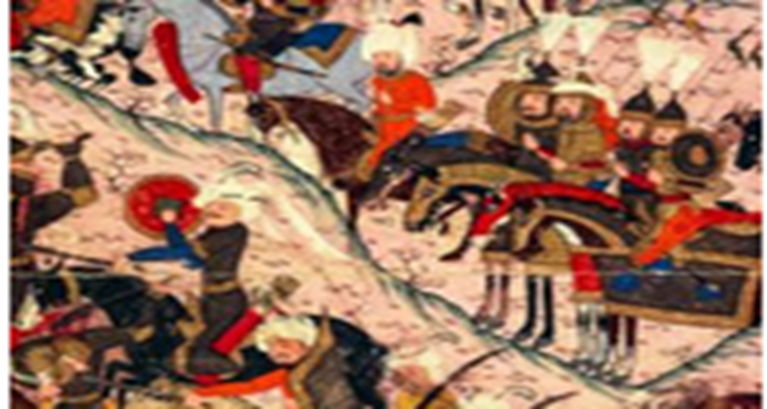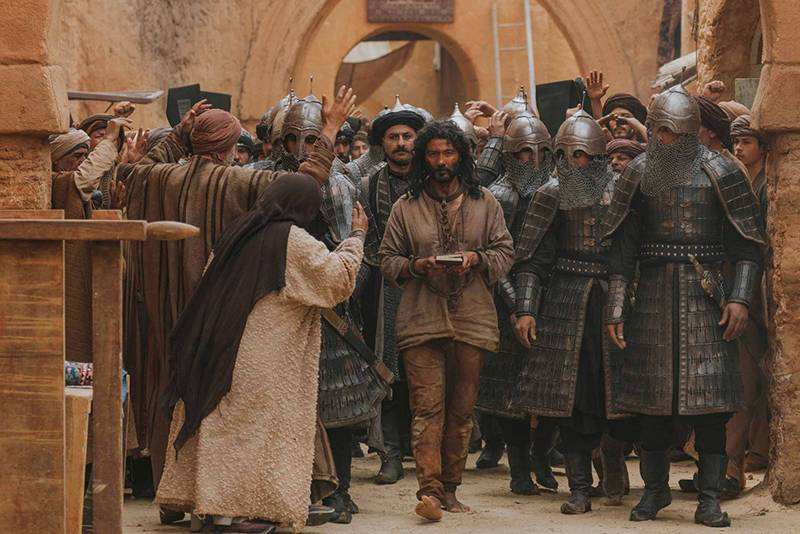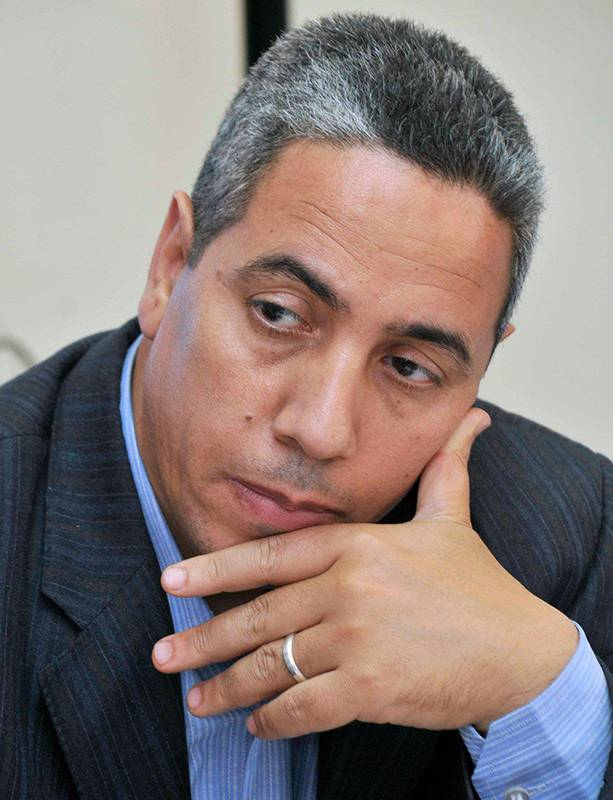Wash your hands after reading this book... "The Long Night of the Ottoman Caliphate"

In most Arab homes, you will find people who have been touched by a spectrum of Turkish drama, and I hear from friends and journalists dialogues they have memorized from series that make the founding sultans among the inspiring geniuses. These poor people compete to restore Mashhad and repeat its dialogue, with admiration raised in place of religious traditions and philosophical rulings, unaware that this “caliphate” began with blood, and with blood it continued, and did not present humanity with a scientific or intellectual achievement, and its aggression did not differentiate between Arab Muslims and others that the history of jurisprudence boasts about. robbery and humiliation of their country. Perhaps it would be fair for Islam to clear its name, even if by apologizing for the bloody side of the policies of Awlad Othman. These are tragedies that have taken root in the European consciousness, and have been preserved by the works of Ivo Andric, Nikos Kazantzakis, and others.
Turkish drama established a specific account of the dawn of the Ottoman Empire. Most Arab viewers receive the series as history, and not as art bearing the vision of its creators. In the political maliciousness, the UAE produced, in 2019, the series “Kingdoms of Fire”, and many saw it as a stick of Moses that invalidates school lies, and blows up the legends of Turkish series that he spent lavishly on their production. I did not get excited about watching "Kingdoms of Fire", because I believed that art produced out of revenge or glorification is direct and targeted. And she followed a part of his traces, and the arts have magic that opens a way to address the conscience, and relives a moment with its joys and tragedies as if it is happening now, and the viewers are crying Tuman Bay, and some announce his performance of Umrah, the reward of which is given to the martyr of his hanging, the invader, the butcher Selim the First.

I ignore the drama made with innocuous intent, and stop in front of coincidences that created drama and the fates of people and peoples. I contemplate the rising moments, these are rare opportunities if they are exploited and bear fruit, and if they are missed, history has another judgment. The establishment of the Ottoman Empire is a cosmic drama. A coincidence made "Othman" the father of a tribe that became a state and an empire. They had fled their country under the leadership of Suleiman Shah, to escape the oppression of Genghis Khan. When they reached the Euphrates, Solomon drowned, and they were pessimistic. Those who wanted returned, and the rest left to the west, led by Ertugrul bin Suleiman to the country of the Romans. They found two teams fighting, and the weakest of them almost perish, Voanoh. The Seljuk Sultan "Aladdin", the owner of Konya, won, and rewarded them by giving them a land on which he was born to Ertuğrul, his son Osman, in 1258 AD.
When I read the book “The Long Night of the Ottoman Caliphate… The Forgotten Biography of Murder,” blood spills into my hands, whenever I read a chapter about a sultan sacrificing his son or younger brother, lest he contest his ruling.
It is said that Othman was born on the day of the fall of Baghdad. And Selim I, by invading Cairo, will carry out Genghis Khan's crimes with the Iraqis. The story of the Ottoman rise was briefly recorded by Noam Bey Choucair in his huge book "The History of Sina". Othman grew up and attacked the enemies of "Aladdin", who declared him a prince, and gave him the title "The Conqueror" in 1299. As for Mohsen Abdul Aziz, he monitors the aftermath of the state, and from his book "The Long Night of the Ottoman Caliphate... The Forgotten Biography of Murder" blood seeps into my hands, Whenever I read a chapter about a sultan sacrificing his son or younger brother, lest he dispute his ruling. The blood dries up, and I start another chapter, and I find a new authority that is more extravagant in killing, and blood is permissible with a fatwa from the Mufti.

Two years before the conquest of Egypt, Selim I, who had a street in Cairo until 2018, led an army to fight Shah Ismail al-Safavi, and was not helped by "Alaa al-Dawla", the ruler of the Turkmen Emirate of Zulqadir, when he passed his land. The book “The Ottoman Conquest of Levant and Egypt” mentions that Selim, after the war, ordered the elimination of Alaa al-Dawla, sent an army, “defeated and beheaded him, along with the heads of four of his sons and thirty of his princes,” and gave the mandate of Zulqadir to Ali bin Shahswar, who would execute Tuman Bey. I do not find a more significant word than “al-istablab” in describing the writings of Egyptians who do not denounce the colonization of their country, but rather call it “the Conquest,” and they establish a historical error indicated by the title of the book “The Ottoman Conquest of Levant and Egypt.”
With the rebellion against God, Selim I invaded Egypt, and sent to Tuman Bey: "God revealed to me that I should own the land and the country from east to west, just as Alexander Dhul-Qarnayn owned it... I am God's successor in his land." Ibn Iyas relates that Ibn Othman's army entered Cairo in January 1517, looted food and property, and kidnapped hostages from homes and roads in exchange for money. Cairo witnessed unprecedented intimidation, and heads were blown "so their bodies were thrown on the roads... over ten thousand people." Was Selim obliged to kill ten thousand Egyptians after the conquest? Whoever is permitted to ascend to the throne on the corpses of his brothers, he will not hesitate to commit what is now classified as a crime against humanity.
The author summarizes a history of his crimes divided between Arab and foreign sources and references, perhaps it cannot bear the gathering of all that blood in one book, nor does it accommodate the struggles of the betrayed souls with their killers in the afterlife. Here, in the book "The Long Night of the Ottoman Caliphate...The Forgotten Biography of Killing", a summary of the results of the competition for power, references to the height of the flame, and the reader has the task of searching for the hidden relationships between the creatures of the oil barrel and the gunpowder, in order to investigate the reasons that lead man to kill his father, brother, or His son, perhaps unconsciously, of the Arabic saying "King is barren". The owner of the king only sees the dangers threatening his throne, and in order to preserve the throne he does not know a friend or a relative, for the king is sterile.
Before bragging about Sultan Mehmed the Conqueror, a distinction had to be made between religious and political. What the "conquerors" did has nothing to do with the Islamic religion, just as the Christian religion is not asked about the Crusades. The author calls things by their names. He mentions Ibn Khaldun’s words in his introduction: “The least civilized nations are the greatest of conquests.” From this generalization he goes to Imam Muhammad Abdo’s description of what was called the Islamic conquests as “political war actions related to the king’s necessities and political requirements.” The Sultan commissioned the architect, Atiq Sinan, to build a large mosque, and the man “the most prolific architects in Ottoman history” built 470 buildings, including 160 mosques. He completed the Dome of Heaven Mosque, and Muhammad al-Fateh did not like it; So he ordered that Sinan's hand be cut off and then executed.
The story of Sinan and the Sultan is based on the book of the British historian Philip Mansell, "Constantinople, the city that the world desired," and it is a primary source in Mohsen Abdel Aziz's book. Perhaps the most dangerous thing that Muhammad Al-Fateh created was the position of the Mufti of Constantinople, and he called him the “Sheikh of Islam”, and he became the third man after the Sultan and the Grand Vizier, and his task was to analyze the crimes of the Sultan, who was of the opinion that his son, the heir to the throne, whoever he was, should “kill his brothers for the sake of the empire.” This became an Ottoman law based on a legitimate justification. Sultan Al-Fatih, his brother fled from him and resided in Rome, and there he pursued and killed him with poison. This law was invoked by Selim I, who "killed his two brothers and four of their sons and poisoned his father Bayezid II."

From Philip Mansell's book, he states that the Ottoman Empire excelled in displaying the skulls and corpses of its victims. The heads of the ministers are displayed on marble columns in the courtyard of the palace, and in the place of the indicative card for the paintings is written the charge of the owner of the severed head. Murder is not equal. The heads of the lesser victims are displayed in niches on either side of the palace's exterior. Class discrimination also extends to the filling materials of the victims, cotton for the ministers, and straw for the wretched. Exhibitions of severed heads were a tradition similar to exhibitions of plastic arts in advanced nations, "and the Turkish public accepted to display heads because it confirms their belief that the murdered were vampires."
I do not find a word more meaningful than “al-istalab” in describing the writings of Egyptians who do not denounce the colonization of their country, but rather call it “the Conquest,” and they establish a historical error indicated by the title of the book “The Ottoman Conquest of Levant and Egypt.”
With the law of murder, Suleiman the Magnificent killed his son "Mustafa", the crown prince. He led an army and defeated his son Abu al-Yazid in 1559, "and slaughtered him and his five children." After the legal ruling, his son Selim II, who died drunk, and his wife kept his news until her son, Murad III, arrived in the capital, and Murad executed "five of his half-brothers, and they were buried with their father under the law of murder." Mansell states, "When Mehmed III sat on the throne in 1595, the chief of the agas entered the harem and brought nineteen brothers to the new sultan, and although they kissed his hands, he ordered them to be strangled... The sultan was so cruel that he snatched a child from his mother's breast and the breast milk came out of his nose for a moment. Soul Exodus.
Enough blood. I look at the “Caliphate” record, and the title of Abu al-Hasan al-Nadawi’s book “What did the world lose with the decline of Muslims?” I wonder: What did Islam and Muslims lose with the rise of the Ottomans? I am waiting for scientific studies that are innocent of revenge, and are aware that the “caliphate” is not from religion, to answer my question. The question remains of religion and modernity, and the trembling sheikhs surrounding Sultan Bayezid II (1481-1512) and their fatwas regarding the sanctity of the printing press at the end of the fifteenth century, thus wasting centuries in which the Islamic world could have risen and gained immunity, and confronted European ambitions that dispelled religious superstition, and permitted the looting of Muslim countries. With the exception of the Ottomans, every occupation left a trace. The French came with the printing press and brought it back. The British abandoned the railways.
Jamal Hamdan states in his book “The Contemporary Islamic World” that “the Arab state ended at the hands of the Turkish invasion, not the Crusader invasion,” and that the Ottoman Empire was “religious colonialism,” and that Turkey did not appear on the stage of world politics “except upon the call of Islam, and only after it jumped on the The caliphate of Islam jumped and perhaps usurped.” It was a revolution for the country." Has the current Turkey swallowed the bitterness of its defeat a hundred years ago?
The answer is no. Turkish arrogance is still a continuation of the Ottoman arrogance. Turkish President Recep Tayyip Erdogan says that Turkey is larger than its current borders, and "we will confront those who try to define the history of Turkey and our nation for ninety years", in a dream of returning to the borders before the defeat in the First European War. As for Omar Fadel, whose official capacity I do not know, he dreams of Greater Turkey. And he threatens in an official session, perhaps in Parliament, where the audience is standing and applauding enthusiastically, that his country is waiting for "the time to come, and the conditions to ripen", and the date will not be suitable for the current geography, Kirkuk will become the 82nd Turkish province, Mosul will be the 83rd province, and there will be no power able to stand against reclaiming this right."
https://raseef22.net/article/1084987-%D8%A7%D8%BA%D8%B3%D9%84%D9%88%D8%A7-%D8%A3%D9%8A%D8%AF%D9%8A%D9%83%D9%85-%D8%A8%D8%B9%D8%AF-%D9%82%D8%B1%D8%A7%D8%A1%D8%A9-%D9%87%D8%B0%D8%A7-%D8%A7%D9%84%D9%83%D8%AA%D8%A7%D8%A8-%D9%84%D9%8A%D9%84-%D8%A7%D9%84%D8%AE%D9%84%D8%A7%D9%81%D8%A9-%D8%A7%D9%84%D8%B9%D8%AB%D9%85%D8%A7%D9%86%D9%8A%D8%A9-%D8%A7%D9%84%D8%B7%D9%88%D9%8A%D9%84?fbclid=IwAR32I8RjxxGk9_PVLPEBdr-hy3rS1PZjAShVnk2dsjP0Feb4-HqO3RCdmNo

